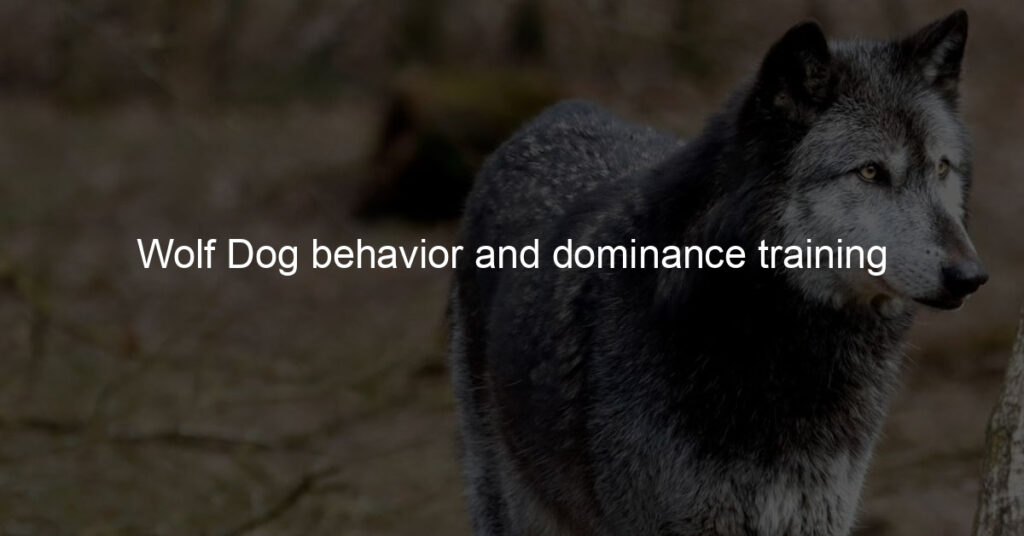Do you own a wolf dog and find it difficult to handle its special behavior needs? If so, then this is the perfect article for you. As a wolf dog owner, understanding your pet’s natural behaviors can be essential when training them and bringing out the best in them.
In this blog post, we will discuss ways to understand your wolf dog’s feral nature as well as dominance techniques that can help channel their energy in more creative ways. By discussing both theoretical advice as well as practical tips and tactics, we hope to arm you with enough information about how to foster healthy relationships with these amazing animals!
What are wolfdog behaviors?
Wolfdogs are creatures of mystery and intrigue – though it’s uncertain exactly where their origins truly lie, we do know a thing or two about their behaviors. Wolfdogs typically exhibit traits of both the canine and the wolf, but this can vary depending on their genetics and their environment. Wolfdogs tend to have higher energy levels than regular household dogs and are often incredibly focused when on a task or mission.
They also have excellent recall of commands due to their highly sensitive nature. On top of that, wolfdogs love interacting with humans, as well as other pets! Plus, they’re incredibly loyal creatures, and can often be found napping contentedly with their human family or playing fetch in the garden!
How do you discipline a wolf dog?
Disciplining a wolf dog isn’t much different from disciplining any other pup — the key is consistency. Start with clear rules and expectations and make sure to model the same behaviors yourself. Establishing a consistent routine will help your fur baby learn how to behave quickly.
When undesired behaviors occur, use positive reinforcement to correct your pup. Praise calm and well-mannered behavior whenever possible and reward accordingly. Wolf dogs sometimes may need more patience and understanding during training, but maintaining a strong demeanor with firm boundaries will ultimately lead to success in their discipline.
Will a wolf-dog protect its owner?
Owning a wolf-dog, or wolf-dog hybrid can be a wonderful experience that rewards owners with breathtaking characteristics and behaviors that regular canine friends don’t have. However, determining whether or not one of these animals will defend its owner is tricky.
It all relies on the individual animal’s personality and history; if it experiences trauma in its past, it’s less likely to form trustworthy relationships. What’s more, an untrained hybrid has an unpredictable nature and can cause harm if scared or threatened.
Ultimately, if you’re looking for an animal that will bond deeply and protect you unconditionally, it’s best to stick with the tried and true — domesticated dogs who have been welcomed into homes for centuries.
How do you establish dominance over a dog?
Establishing dominance over a dog doesn’t have to be an intimidating or stressful experience. It’s all about finding the right balance between letting your pup know that you’re the one in charge, and also showing them love and understanding. To establish dominance, try being consistent when it comes to rules and boundaries.
Positive reinforcement is usually more effective than punishment. It’s also important for the owner of the dog to think like a pack leader: stay calm and assertive, walk ahead of your dog on walks, especially through doorways, reward good behavior with treats and affection, and ignore bad behavior unless it is necessary to intervene if safety is an issue. Doing these things consistently will make your pup understand that you are the leader in your relationship.
Final thoughts: Wolf Dog behavior and dominance training
After considering the key points of wolf-dog behavior and dominant training, it’s important to remember that these animals have unique personalities. Even though they might be able to be trained as dogs, you should always respect them for who they are: wild animals with instincts that guide their decision-making process.
It’s not wise to take them out of their natural environment without researching the proper advice and techniques to manage their behavior. If you can do this, though, owning a wolf dog could be a truly rewarding and enlightening experience that can provide several benefits for both you and your furry canine companion!








